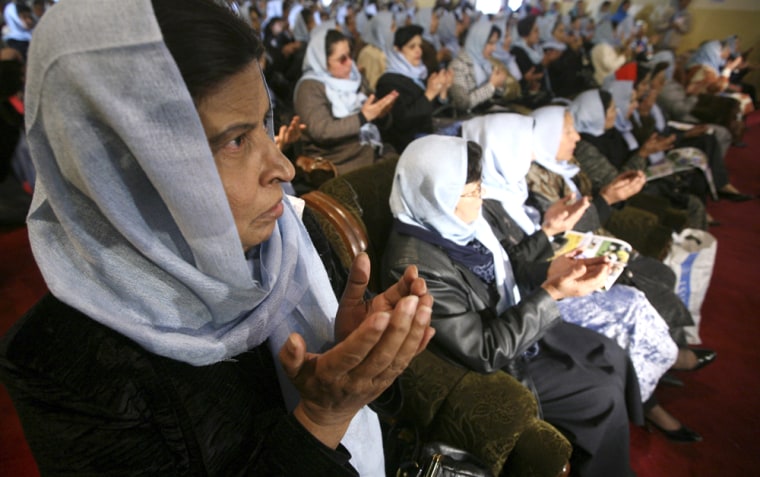A controversial law that critics say legalizes marital rape is unconstitutional and leads toward the "Talibanization" of Afghanistan's legal system, according to a petition signed by dozens of Afghan ministers, lawmakers and officials.
The law, quietly passed and signed last month, has stirred international outcry over women's rights. The law says a husband can have sex with his wife every four days unless she is ill, and it regulates when and for what reasons a wife may leave home alone.
Critics have said the legislation undermines hard-won rights for women enacted after the fall of the Taliban's strict Islamist regime in 2001. The regime banned women from appearing in public without a body-covering burqa and a male escort from her family.
Following an international outcry, with President Barack Obama calling the law "abhorrent," President Hamid Karzai ordered its review.
The Justice Ministry has said the law — which has not been published in the official registry and would apply only to the country's Shiite population, between 10 percent and 20 percent of Afghanistan's 30 million people — is not being enforced while it is under review.
Women's rights 'violated'
"We are greatly dismayed and express sincere apologies to Afghan sisters and mothers, civil society and others who are committed to the preservation of human rights," said a petition signed Wednesday by more than 100 Afghan officials and public figures, including six government ministers and 22 lawmakers.
The law contradicts the country's constitution and human rights, treating women as objects rather than subjects, the joint declaration said.
"Notwithstanding the advancement of Afghan women, including their active participation in the political and social spheres, the rights of women have once again been neglected and violated in the name of 'law,'" the petition said.
"We believe that all those who support democracy ... will confront the Talibanization of the legal system of the country with determined efforts," it said.
Much has improved since the fall of the Taliban. Millions of girls now attend school, and many women own businesses. Of 351 parliamentarians, 89 are women.
But in this conservative country, critics fear those gains could easily be reversed.
On patrol
The petition came as Poland's President Lech Kaczynski held talks in Kabul with Karzai and reiterated his country's plans to increase its troop contribution in the country by 20 percent this year.
Poland has 1,600 troops in Afghanistan as part of the NATO-led force and is among the few countries other than the United States to substantially increase the number of soldiers pledged to fight insurgent groups.
Southern Afghanistan is the center of a growing Taliban-led insurgency, where thousands of new U.S. troops will deploy later this year to try to reverse militant gains of the last three years.
NATO said in a statement that one of its soldiers was killed Wednesday in a "hostile incident" in southern Afghanistan, but it did not provide the exact location of the incident or the nationality of the victim.
In the southern Uruzgan province, U.S. coalition and Afghan troops killed six militants with mortar fire while they were planting roadside bombs and constructing an ambush site Wednesday, the coalition said in a statement.
Also Wednesday, a roadside blast hit a civilian vehicle south of Kandahar city, wounding six civilians, said the spokesman for Kandahar province's governor, Zalmai Ayubi.
Two of those hurt were in critical condition, he said.
Militants regularly plant bombs alongside roads used by foreign and Afghan troops, but the majority of victims in those attacks are civilians.
